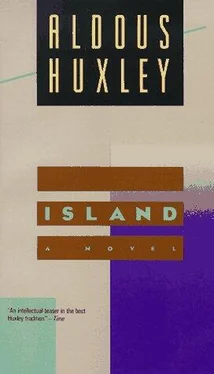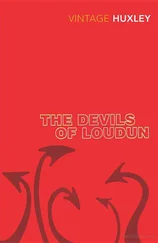Aldous Huxley - Island
Здесь есть возможность читать онлайн «Aldous Huxley - Island» весь текст электронной книги совершенно бесплатно (целиком полную версию без сокращений). В некоторых случаях можно слушать аудио, скачать через торрент в формате fb2 и присутствует краткое содержание. Жанр: Социально-психологическая фантастика, на английском языке. Описание произведения, (предисловие) а так же отзывы посетителей доступны на портале библиотеки ЛибКат.
- Название:Island
- Автор:
- Жанр:
- Год:неизвестен
- ISBN:нет данных
- Рейтинг книги:3 / 5. Голосов: 1
-
Избранное:Добавить в избранное
- Отзывы:
-
Ваша оценка:
- 60
- 1
- 2
- 3
- 4
- 5
Island: краткое содержание, описание и аннотация
Предлагаем к чтению аннотацию, описание, краткое содержание или предисловие (зависит от того, что написал сам автор книги «Island»). Если вы не нашли необходимую информацию о книге — напишите в комментариях, мы постараемся отыскать её.
Island — читать онлайн бесплатно полную книгу (весь текст) целиком
Ниже представлен текст книги, разбитый по страницам. Система сохранения места последней прочитанной страницы, позволяет с удобством читать онлайн бесплатно книгу «Island», без необходимости каждый раз заново искать на чём Вы остановились. Поставьте закладку, и сможете в любой момент перейти на страницу, на которой закончили чтение.
Интервал:
Закладка:
The scene changed again and, festooned with tin stars and fairy lamps, Aunt Mary's face smiled at him gaily and then was transformed before his eyes into the face of the whining, malignant stranger who had taken her place during those last dreadful weeks before the final transformation into garbage. A radiance of love and goodness, and then a blind had been drawn, a shutter closed, a key turned in the lock, and there they were-she in her cemetery and he in his private prison sentenced to solitary confinement and, one unspecified fine morning, to death. The Agony in the Bargain Basement. The Crucifixion among the Christmas-tree decorations. Outside or in, with the eyes open or with the eyes closed, there was no escape.
"No escape," he whispered, and the words confirmed the fact, transformed it into a hideous certitude that kept opening out, opening down, into depth below depth of malignant vulgarity, hell beyond hell of utterly pointless suffering.
And this suffering (it came to him with the force of a revelation)-this suffering was not merely pointless; it was also cumulative, it was also self-perpetuating. Surely enough, frightfully enough, as it had come to Molly and Aunt Mary and all the others, death would come also to him. Would come to him, but never to this fear, this sickening disgust, these lacerations of remorse and self-loathing. Immortal in its pointlessness, suffering would go on forever. In all other respects one was grotesquely, despicably finite. Not in respect to suffering. This dark little inspissated clot that one called "I" was capable of suffering to infinity and, in spite of death, the suffering would go on forever. The pains of living and the pains of dying, the routine of successive agonies in the bargain basement and the final crucifixion in a blaze of tin and plastic vulgarity-reverberating, continuously amplified, they would always be there. And the pains were incommunicable, the isolation complete. The awareness that one existed was an awareness that one was always alone. Just as much alone in Babs's musky alcove as one had been alone with one's earache or one's broken arm, as one would be alone with one's final cancer, alone, when one thought it was all over, with the immortality of suffering.
He was aware, all of a sudden, that something was happening to the music. The tempo had changed. Ralkntando. It was the end. The end of everything for everyone. The jaunty little death dance had piped the marchers on and on to the edge of the cliff. And now here it was, and they were tottering on the brink. Ral-lentando, rallentando. The dying fall, the fall into dying. And punctually, inevitably, here were the two anticipated chords, the consummation, the expectant dominant and then, finis, the loud unequivocal tonic. There was a scratching, a sharp click, and then silence. Through the open window he could hear the distant frogs and the shrill monotonous rasp of insect noises. And yet in some mysterious way the silence remained unbroken. Like flies in a block of amber, the sounds were embedded in a transparent soundlessness which they were powerless to destroy or even modify, and to which they remained completely irrelevant. Tunelessly, from intensity to intensity, the silence deepened. Silence in ambush, a watching, conspiratorial silence incomparably more sinister than the grisly little rococo death march which had preceded it. This was the abyss to whose brink the music had piped him. To the brink, and now over the brink into this everlasting silence.
"Infinite suffering," he whispered. "And you can't speak, you can't even cry out."
A chair creaked, silk rustled, he felt the wind of movement against his face, the nearness of a human presence. Behind his closed lids he was somehow aware that Susila was kneeling there in front of him. An instant later he felt her hands touching his face-the palms against his cheeks, the fingers on his temples.
The clock in the kitchen made a little whirring noise, then started to strike the hour. One, two, three, four. Outside in the garden a gusty breeze whispered intermittently among the leaves. A cock crowed and a moment later, from a long way off, came an answering call, and almost simultaneously another and another. Then an answer to the answers, and more answers in return. A counterpoint of challenges challenged, of defiances defied. And now a different kind of voice joined in the chorus.
Articulate but inhuman. "Attention," it called through the crowing and the insect noises. "Attention. Attention. Attention."
"Attention," Susila repeated; and as she spoke, he felt her fingers starting to move over his forehead. Lightly, lightly, from the brows up to the hair, from either temple to the midpoint between the eyes. Up and down, back and forth, soothing away the mind's contractions, smoothing out the furrows of bewilderment and pain. "Attention to this." And she increased the pressure of her palms against his cheekbones, of her fingertips above his ears. "To this" she repeated. "To now. Your face between my two hands." The pressure was relaxed, the fingers started to move again across his forehead.
"Attention." Through a ragged counterpoint of crowing, the injunction was insistently repeated. "Attention. Attention. Atten . . ." The inhuman voice broke off in midword.
Attention to her hands on his face? Or attention to this dreadful glare of the inner light, to this uprush of tin and plastic stars and, through the barrage of vulgarity, to this packet of garbage that had once been Molly, to the whorehouse looking glass, to all those countless corpses in the mud, the dust, the rubble. And here were the lizards again and Gongylusgongyloides by the million, here were the marching columns, the rapt, devoutly listening faces of Nordic angels.
"Attention," the mynah bird began to call again from the other side of the house. "Attention."
Will shook his head. "Attention to what?"
"To this." And she dug her nails into the skin of his forehead. "'This. Here and now. And it isn't anything so romantic as suffering and pain. It's just the feel of fingernails. And even if it were much worse, it couldn't possibly be forever or to infinity. Nothing is forever, nothing is to infinity. Except, maybe, the Buddha Nature."
She moved her hands, and the contact now was no longer with nails but with skin. The fingertips slid down over his brows and, very lightly, came to rest on his closed eyelids.For the first wincing moment he was mortally afraid. Was she preparing to put out his eyes? He sat there, ready at her first move to throw back his head and jump to his feet. But nothing happened. Little by little his fears died away; the awareness of this intimate, unexpected, potentially dangerous contact remained. Ai awareness so acute and, because the eyes were supremely vulnerable, so absorbing that he had nothing to spare for the innei light or the horrors and vulgarities revealed by it.
"Pay attention," she whispered.
But it was impossible not to pay attention. However, gently and delicately, her fingers had probed to the very quick of his consciousness. And how intensely alive, he now noticed, those fingers were! What a strange tingling warmth flowedout of them!
"It's like an electric current," he marveled.
"But luckily," she said, "the wire carries no messages. One touches and, in the act of touching, one's touched. Complete communication, but nothing communicated. Just an exchange of life, that's all." Then, after a pause, "Do you realize, Will," she went on, "that in all these hours we've been sitting here-all these centuries in your case, all these eternities-you haven't looked at me once? Not once. Are you afraid of what you might see?"
He thought over the question and finally nodded his head. "Maybe that's what it was," he said. "Afraid of seeing something I'd have to be involved with, something I might have to do something about."
Читать дальшеИнтервал:
Закладка:
Похожие книги на «Island»
Представляем Вашему вниманию похожие книги на «Island» списком для выбора. Мы отобрали схожую по названию и смыслу литературу в надежде предоставить читателям больше вариантов отыскать новые, интересные, ещё непрочитанные произведения.
Обсуждение, отзывы о книге «Island» и просто собственные мнения читателей. Оставьте ваши комментарии, напишите, что Вы думаете о произведении, его смысле или главных героях. Укажите что конкретно понравилось, а что нет, и почему Вы так считаете.











